UN aid convoy bombed in Mellit, North Darfur – Who is responsible?
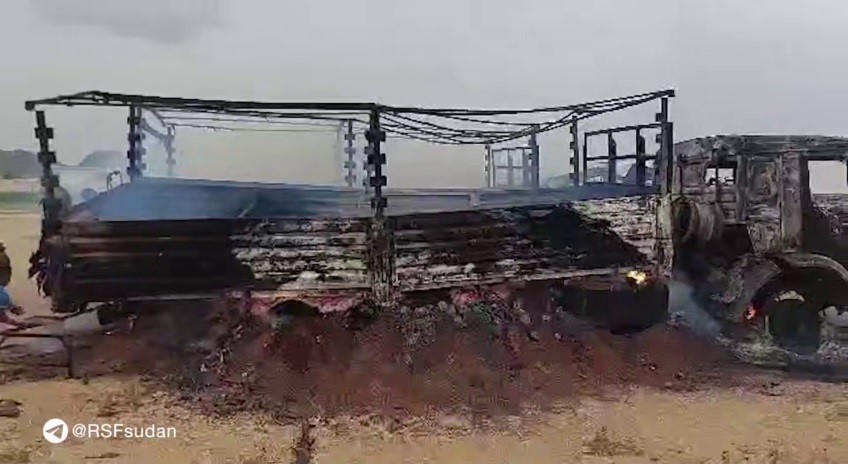
A burned aid truck in Mellit, North Kordofan - August 20, 2025 - Screenshot from a video published by the Rapid Support Forces media
The bombing of a World Food Programme (WFP) aid convoy on Wednesday morning in the town of Mellit, North Darfur, sparked widespread international and local reactions, with the Rapid Support Forces (RSF) and the army trading accusations over the bombing.
The RSF have controlled the city of Mellit, 65 kilometres away, since April 2024. The city is a major commercial port linking Sudan to Libya and has gained significant importance as one of the country’s main commercial centres since the outbreak of the armed conflict.
Previous incidents
The city has been subjected to dozens of airstrikes since the RSF took control of it, most recently on Thursday, August 14, and Sunday, August 17, before the convoy was bombed on Wednesday, August 20.
Radio Dabanga sources reported that two people were killed when a suicide drone bombed the El Marakeb market at the Libya bus station in Mellit on Sunday, August 17, in addition to the burning of several shops and a vehicle. The sources explained that another missile hit a fuel tanker in the El Marakeb neighbourhood, without causing any casualties. On Thursday, August 14, a suicide drone targeted two military vehicles in El Zariba, with shrapnel hitting a number of civilians.
Radio Dabanga documented dozens of incidents revealing the deaths of civilians and livestock in Mellit over the course of a year and four months. Media sources close to the army have been publishing news of airstrikes on Mellit and other towns as they occurred, with the exception of the convoy bombing, which RSF commanders took the initiative to document on video.
In early June, a joint humanitarian convoy was bombed near the town of El Koma, North Darfur, killing five convoy members and wounding others. Several trucks were also burned, and vital humanitarian supplies were damaged. The army and the RSF traded accusations for the attack on the humanitarian convoy, which occurred in El Koma yesterday evening, with each side publishing photos of the burned trucks. The RSF control El Koma, which has been subjected to repeated aerial and drone strikes by the army, most recently last week.
Details of the bombing
A video released by the RSF shows two trucks engulfed in flames, with smoke billowing from them. The video also shows other trucks bearing the World Food Programme logo, intact. The spokesperson in the video said the attack occurred on Wednesday, August 20, at 12 noon. He also noted that the bombing targeted other areas of the city, adding that the convoy came through the Tina crossing on the Chadian border, which is controlled by the armed forces and the joint force.
Screenshots from videos released by the RSF.
Mutual accusations
Hours after the video was released, the RSF issued an official statement accusing the army of targeting a World Food Programme aid convoy of 16 trucks, destroying two of them, while they were inside the Mellit customs facility.
She stated that the attack targeted the Mellit market and the customs checkpoint, resulting in dozens of civilian deaths and injuries. She called on the international community and humanitarian and human rights organisations to clearly and explicitly condemn this criminal attack and launch an urgent investigation to hold accountable those responsible for targeting relief convoys. She emphasised the need for immediate pressure to halt the army’s attacks on humanitarian workers.
For his part, the official spokesman for the Founding Alliance, Dr. Alaa Naqd, in a statement seen by Radio Dabanga, considered the bombing of the convoy a blatant violation of international humanitarian law and the Geneva Conventions, and a deliberate disregard for the lives of millions of Sudanese living under the yoke of war and hunger. He accused the army of carrying out the bombing.
In contrast, the armed forces, in a statement yesterday, described the accusations against them as misleading, an attempt by the RSF to cover up their crime of targeting the convoy in the same area.
The statement said that what the RSF had published was “mere, familiar lies, an attempt to obscure the truth and distort the reality that exposes its ongoing violations.” It accused the RSF of theft, looting, sabotage, murder, rape, the siege and starvation of residents of El Fasher and other cities, and the invasion of camps for displaced persons in Darfur.
The statement added: “The Sudanese government, which has agreed to open humanitarian aid routes, including the Adré border crossing with Chad, cannot in any way target any aid convoys arriving for the benefit of civilians.”
The Humanitarian Sector of the Civil Democratic Alliance of Revolutionary Forces (Sumud) also condemned the bombing of the humanitarian aid convoy in Mellit, pointing to the ongoing targeting of humanitarian efforts by the RSF and the Sudanese Armed Forces, ignoring international laws that prohibit the use of starvation as a weapon against civilians in war, and showing no concern for their plight and ongoing suffering.
Air attack targets
The army’s airstrikes on Mellit aim to cut off supply lines, as the city serves as an advanced point for the RSF (RSF) to obtain fuel and equipment from the Libyan border. Flight records document numerous flights by Emirati cargo planes to Kufra, while Emirati cargo flights to Chad have been halted for three months. The Sudanese government accuses the UAE of aiding the RSF, a charge the latter consistently denies.
Convoy details
Last Monday, the Darfur Regional Government, headed by Minni Arko Minawi, announced the arrival of 17 food aid trucks in the Mellit locality in North Darfur, carrying 260 tons of food supplies provided by the World Food Programme.
He explained that this aid is sufficient to cover the food needs of approximately 23,000 beneficiaries, including displaced persons and host families, and will be distributed according to a plan covering the areas of Mellit, El Abbasi, Sayah, Abu Qu, and Armel.
Authorities confirmed that the convoy arrived safely after security forces and the joint force secured the crossing routes. Abdel-Baqi Mohamed Hamid, Director General of Social Welfare and Humanitarian Affairs Coordinator, then appealed to the RSF and all its allied parties to adhere to the principles of humanitarian action and allow relief convoys to enter El Fasher to provide relief to the citizens.
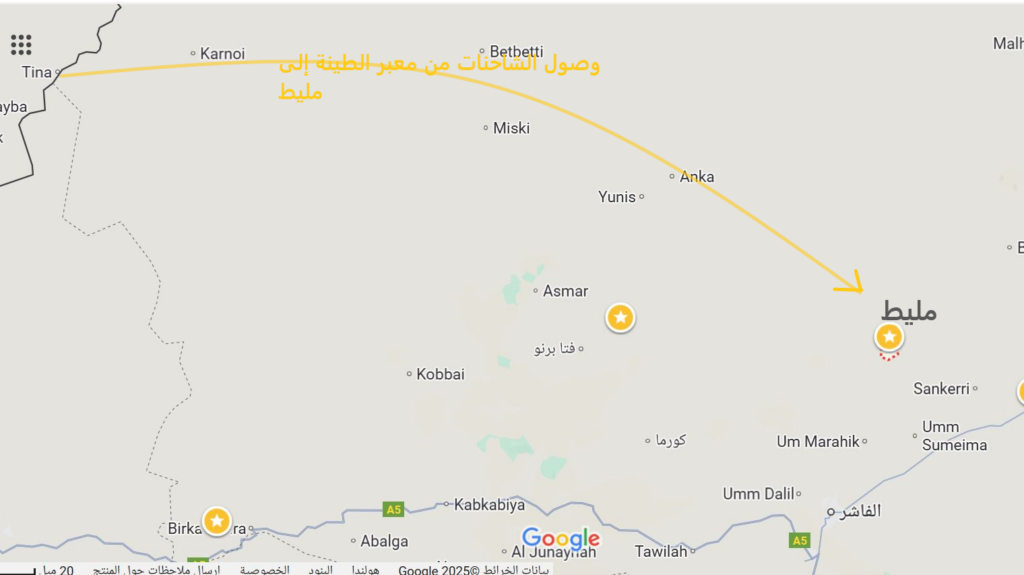
World Food Programme reveals details
The World Food Programme announced that a 16-truck convoy carrying life-saving food aid for the most vulnerable in the village of El Saya was attacked near Mellit, a famine-affected area in North Darfur.
In a brief press release seen by Radio Dabanga yesterday, the program said: “Three trucks were damaged and caught fire, but all members of the convoy are safe.” It added: “We are working urgently to gather additional information about the circumstances and assess their impact on our operations.”
The programme called on all parties to the conflict to respect international humanitarian law and ensure the safety of humanitarian workers and supplies, stressing that humanitarian workers and their property must never be targeted.

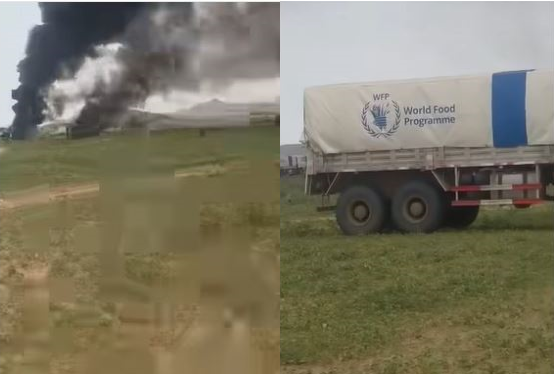
US and Norwegian condemnation
US Presidential Advisor for African Affairs Masad Boulos condemned the attack on three World Food Programme trucks in North Darfur on Wednesday, which destroyed food supplies intended for famine victims.
In a tweet on the X platform, Paul reiterated his call for ensuring unhindered humanitarian access and the protection of civilians, demanding that perpetrators of any violations of international humanitarian law be held accountable.
For their part, Norwegian Foreign Minister Espen Barth Eide and International Development Minister Asmund Åkerost issued a joint statement regarding the attack on a World Food Programme aid convoy in Darfur.
The statement explained that the attack occurred on a convoy en route to Mellit carrying life-saving aid. It added: “Attacking brave humanitarian workers who risk their lives to help those in need is completely unacceptable. The famine in North Darfur is man-made. Humanitarian organisations are ready to help, but they are being prevented from doing their work. This must stop.”
The statement referred to the shocking reports from El Fasher, which is besieged by the RSF, explaining that the fighting, the limited presence of international aid workers and journalists, and restrictions on the internet and communications are limiting the flow of information from Darfur. The statement called on the RSF to immediately implement Security Council Resolution 2736, lift the siege of El Fasher, and refrain from attacking civilians. It urged all armed parties to respect international humanitarian law, protect civilians, and facilitate the delivery of humanitarian aid.
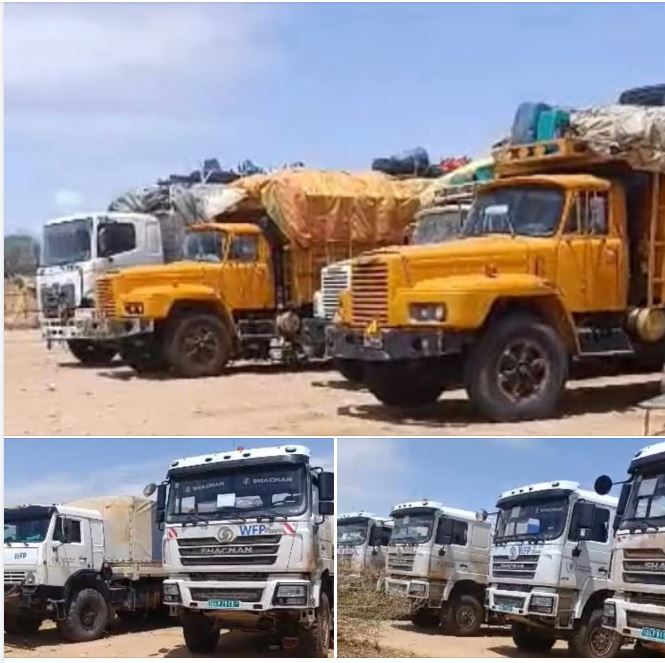
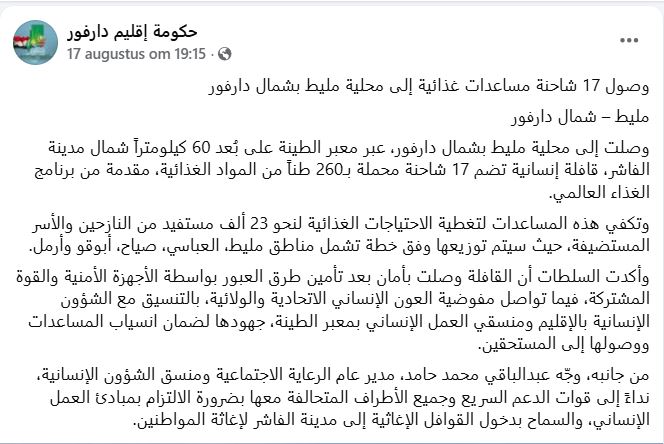
Attacks complicate humanitarian work
In an interview with Radio Dabanga, humanitarian expert Dr. Manal Abdel Halim confirmed that repeated attacks on convoys complicate the task of delivering aid, especially given the warring parties’ denial of responsibility for these violations. This makes it extremely difficult to characterise these crimes and hold their perpetrators accountable.
She noted that the UN system, particularly the Office for the Coordination of Humanitarian Affairs (OCHA), is making concerted efforts to ensure that aid is free of prohibited materials and secures its passage, but that the risks on the ground remain high.
The expert revealed that the most alarming aspect is the rising death toll among humanitarian workers, with at least 120 people killed over the past two years, including doctors, healthcare workers, and transportation and distribution workers. She described this number as “alarming and unprecedented,” noting that even other conflict zones, such as Gaza, have not witnessed such a high number in such a short period of time.
Manal concluded her remarks by emphasising that the continuation of these attacks, coupled with the extortion of humanitarian organisations by some military actors, threatens the future of relief work in Sudan. She called on all warring parties to shoulder their responsibilities and protect humanitarian aid, which is a lifeline for millions of civilians facing catastrophic conditions.









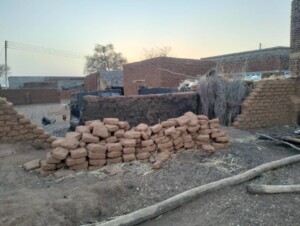

 and then
and then